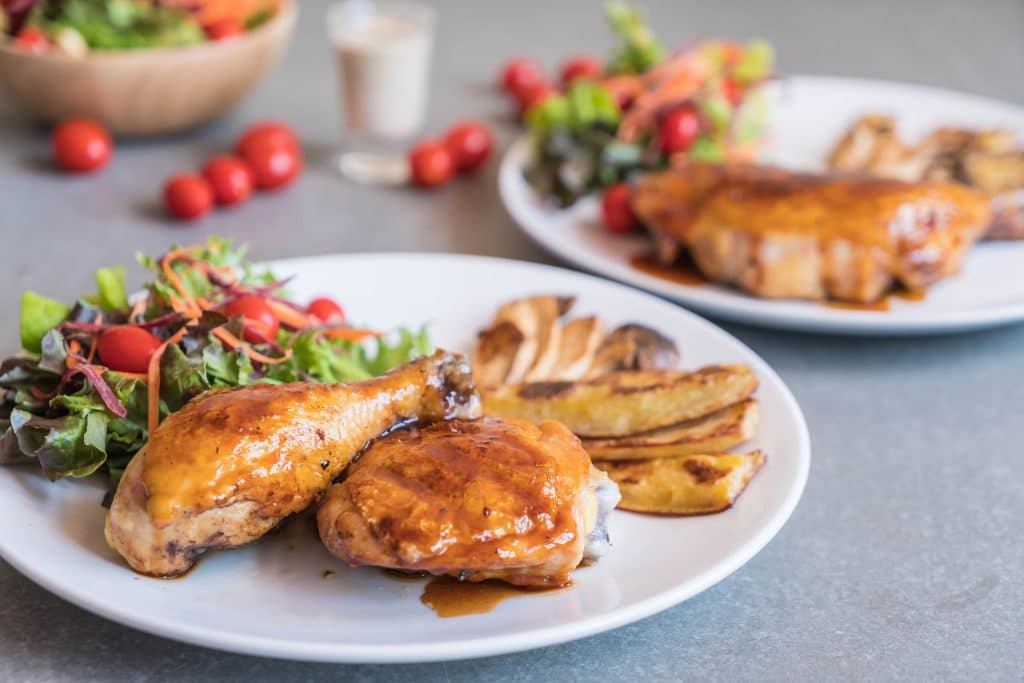- According to new research presented at the American Heart Association’s Scientific Sessions, eating late at night on a regular basis could up your risk of heart disease.
- Consuming the bulk of your day’s calories in the evening messes with your circadian rhythms, which can throw your metabolic system out of whack and cause damage to your heart.
- Instead, aim to eat a bigger lunch and a lighter dinner, so you get more calories in the afternoon instead of at night.
You should eat your dinner before the night takes hold, to keep your ticker tocking in peace; this is what new research is indicating.
After a busy day at work, it’s only natural to want to unwind by hitting the gym or hopping on your bike to go for a ride. And by the time you actually sit down for dinner, it might already be 8 p.m. Unfortunately, those late-evening meals may be raising your risk of cardiovascular disease, preliminary research suggests.
Presenting recently at the American Heart Association’s (AHA) Scientific Sessions meeting, researchers noted that women who consumed a higher proportion of their calories after 6 p.m. were more likely to have cardiovascular disease risks than women who ate earlier.
Every 1 percent increase in night-time calories consumed after 8 p.m. boosted the likelihood of higher blood pressure, less long-term control of blood sugar, and higher body mass index—which all contribute to heart risks, according to lead researcher Nour Makarem, Ph.D., postdoctoral research fellow at Columbia University’s Vagelos College of Physicians and Surgeons.
Researchers looked at 112 women—with an average age of 33—and examined lifestyle factors such as smoking, physical activity, type of food eaten, as well as health markers such as cholesterol, blood pressure, and blood sugar. Study participants kept electronic food diaries to track what they ate for one week both at the start and at the finish of the one-year research period.
“What we found is that when we eat may be just as important as what we eat and how much we eat,” Makarem told Bicycling.
READ MORE The Best Energising Foods For Cyclists
These results are in line with research that was done last year by Makarem and her colleagues, looking specifically at evening eating in the Hispanic/Latino population. In that research, the greater the percentage of calories consumed after 6 p.m., the higher the fasting glucose and insulin, as well as increased insulin resistance—which are all precursors to diabetes and high blood pressure. (As we’ve previously reported, insulin regulates your blood glucose levels by moving the sugars from the foods you eat into your cells. If insulin levels are out of whack, the sugars can stay in your bloodstream, which can harm organs like your heart.)
Although the recent study presented at the AHA’s Scientific Sessions meeting focused on women’s cardiovascular health, Makarem said both men and women who eat later in the evening could be raising their chances of all of these issues, mainly because eating in the evening messes with your circadian rhythms.
“These rhythms are the innate, 24-hour cycle that ensures our bodies are synchronized with the environment, and they’re controlled by a master clock in the brain that is entrained by light,” she said. “However, our organs—including those involved in digestion and metabolism—also have clocks that regulate their function, which are entrained by food signals.”
Our bodies aren’t designed to consume a greater proportion of our calories in the evening.
When we load up at night, the “clocks” in our organs become misaligned with the master clock in the brain. That creates a state of metabolic dysfunction—a disruption in your body’s process to get or make energy from the foods you consume—said Makarem, and that’s what may predispose you to heart disease.
What if you work late, tend to dine in the evenings, or simply don’t feel like having dinner at 5 p.m.? The researchers aren’t suggesting skipping food altogether once the sun goes down—in fact, most of the study participants in the recent research ate some food after 6 p.m. It’s the number of calories you need to watch.
The better strategy, according to Makarem, is to get the majority of your calories earlier in the day and opt for a light, easily-digestible meal of whole foods. That way, you can still eat dinner without throwing off your circadian rhythms.

